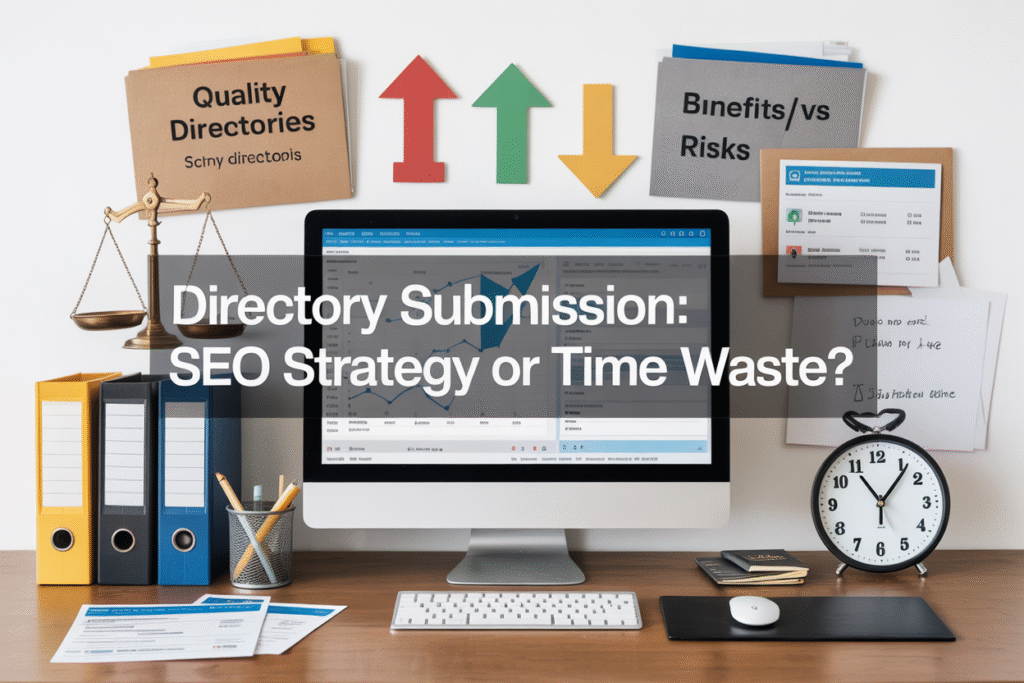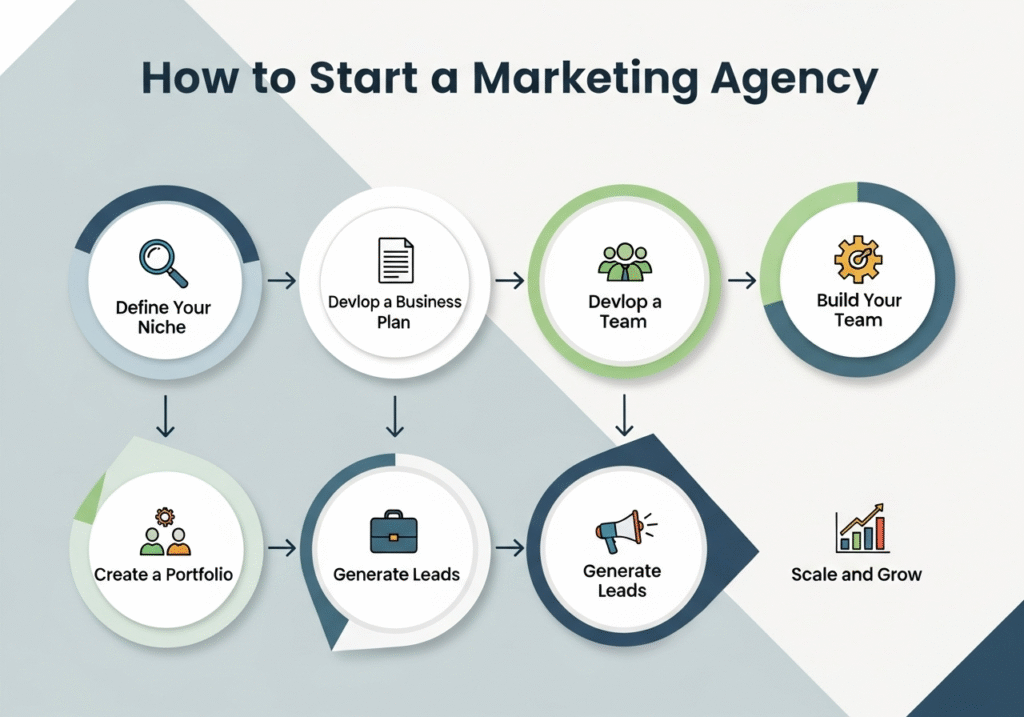Many website owners and digital marketers wonder if directory submission is worth their time in today’s SEO landscape. While some dismiss it as an outdated practice, others swear by strategic directory submission for building quality backlinks and improving local visibility.
This guide is designed for small business owners, bloggers, and SEO professionals who want to cut through the confusion and get straight facts about directory submission SEO. You’ll discover whether directory submission benefits still exist in modern search algorithms and how to avoid wasting hours on low-value submissions.
We’ll explore the quality vs quantity debate that defines successful directory submission strategy, examine the real SEO benefits you can still gain from reputable directory submission websites, and reveal how poor execution can actually hurt your rankings.
You’ll also get practical directory submission tips for maximizing your time investment and identifying which seo directory submission opportunities deserve your attention.
What Is Directory Submission in Modern SEO?

What directory submission actually means for your website
Directory submission involves adding your website’s information to online directories that categorize and list businesses or websites by industry, location, or topic. Think of it like the digital version of Yellow Pages, where you submit your site’s URL, title, description, and contact details to various directory platforms.
When you submit to directories, you’re essentially creating citations and potential backlinks that point back to your website. These submissions can range from general business directories like Yelp and Yellow Pages to niche-specific directories that cater to particular industries or geographic regions.
The process typically involves filling out forms with your business information, selecting appropriate categories, and sometimes paying fees for premium listings. Some directories automatically approve submissions, while others require manual review before your listing goes live.
How search engines view directory links today
Search engines have dramatically changed how they evaluate directory submission seo value over the past decade. Google’s algorithms now scrutinize directory links with much more sophistication, distinguishing between legitimate business directories and low-quality link farms.
High-quality directories that provide genuine value to users – like industry-specific directories or well-established local business listings – still carry some weight in search rankings. These directories typically have editorial oversight, user reviews, and actual human visitors who use them to find businesses.
However, Google’s Penguin algorithm specifically targets manipulative link schemes, including mass directory submissions to poor-quality sites. The search engine now evaluates directory links based on:
- Editorial quality: Does the directory have standards for inclusion?
- User engagement: Do real people actually use this directory?
- Relevance: Does the directory match your business type or location?
- Authority: Is the directory itself a trusted resource?
The evolution from high-value to questionable practice
Directory submission used to be a cornerstone of early SEO strategies when the internet was smaller and search engines relied heavily on basic link counting. Back then, simply getting listed in numerous directories could boost your rankings significantly.
The golden age of directory submission lasted roughly from the late 1990s through the mid-2000s. During this period, directories like DMOZ (Open Directory Project) and Yahoo Directory held substantial influence over search rankings.
Getting accepted into these prestigious directories was like receiving a stamp of approval that could dramatically improve your visibility. The decline began around 2010-2012 when Google started rolling out algorithm updates that devalued low-quality directory links
Many SEO practitioners had abused the system by creating thousands of directory sites solely for link building purposes, leading to a polluted landscape of worthless directory submissions.
Today’s directory submission landscape splits into two distinct categories: legitimate business directories that serve actual users, and questionable directories that exist primarily for SEO manipulation. The challenge lies in identifying which directories still provide value versus those that might actually harm your rankings.
Quality vs Quantity: The Directory Submission Spectrum

High-authority directories that still provide SEO value
Some directories maintain their reputation and continue offering genuine SEO benefits. DMOZ’s legacy lives on through sites like Curlie, while industry-specific directories like Better Business Bureau, Yelp for local businesses, and professional directories like Avvo for lawyers still carry significant weight.
Top-tier directories worth considering:
- Yelp – Essential for local businesses with high domain authority
- Google My Business – Critical for local SEO visibility
- Industry associations – Professional directories related to your niche
- Government directories – .gov and .edu affiliated listings
- Chamber of Commerce – Local business credibility boost
These platforms don’t just provide backlinks; they drive actual traffic and build trust with both search engines and potential customers. The key difference lies in their editorial standards and user engagement levels.
Low-quality directories that can harm your rankings
Directory submission websites that operate purely for link building can seriously damage your SEO efforts. These sites typically feature hundreds of outbound links per page, minimal content, and zero editorial oversight. Google’s algorithms have become sophisticated at identifying and penalizing these link schemes.
Warning signs of harmful directories:
| Red Flag | Impact |
|---|---|
| Excessive outbound links (100+) | Diluted link value |
| No editorial review process | Spam association |
| Accept any website instantly | Quality concerns |
| Multiple categories per listing | Manipulation signals |
| Broken design/functionality | Poor user experience |
Submitting to these directories can trigger Google penalties, making your recovery efforts time-intensive and costly. The risk far outweighs any perceived benefit from quick backlink generation.
How to identify directories worth your time?
Smart directory submission strategy starts with thorough research. Check the directory’s domain authority using tools like Moz or Ahrefs. Look for sites scoring above 30, but don’t rely on metrics alone.
Evaluation checklist:
- Editorial standards – Do they review submissions manually?
- Content quality – Are existing listings detailed and valuable?
- User engagement – Active comments, reviews, or interactions?
- Niche relevance – Does it serve your target audience?
- Update frequency – Regular content additions and maintenance?
The best directories feel more like resources than link farms. They provide value to users beyond just listing businesses, often including reviews, articles, or industry insights.
Red flags that signal spammy directory sites
Recognizing spammy directories saves time and protects your SEO investment. These sites often promise instant approval, charge minimal fees, or guarantee specific ranking improvements – all major warning signs.
Immediate red flags include:
- Instant submission approval without human review
- Guaranteed SEO results or ranking promises
- Excessive advertising cluttering the interface
- Broken or outdated design suggesting neglect
- Foreign language content mixed with English listings
- No contact information or customer support
- Suspicious payment methods or cryptocurrency requirements
Pay attention to the directory’s existing listings too. If you see obvious spam, adult content mixed with business listings, or completely irrelevant categories, steer clear. Quality directories maintain strict standards and regularly clean their databases to remove problematic entries.
Real SEO Benefits You Can Still Gain

Local SEO Boost Through Niche Directory Listings
Directory submission can deliver genuine value for local businesses when done strategically. Local directories like Google My Business, Yelp, and industry-specific platforms create powerful citation signals that search engines use to verify your business legitimacy.
These citations – mentions of your business name, address, and phone number – help search engines understand your location and relevance to local searches. Niche directories targeting your specific industry carry extra weight.
A restaurant listed in food-focused directories or a law firm featured in legal professional directories gains credibility both with search engines and potential customers. These specialized platforms often have engaged audiences actively seeking services in your field.
The key lies in selecting directories that align with your business category and location. Regional business directories, chamber of commerce listings, and trade association directories offer the strongest local SEO benefits. Each quality listing reinforces your business’s connection to your geographic area and industry.
Referral Traffic Opportunities From Relevant Directories
Quality directories generate actual visitors, not just SEO value. Users browsing industry-specific directories are actively looking for services or products, making them highly qualified prospects. Unlike random web traffic, directory visitors often have purchase intent.
Professional directories like Better Business Bureau or trade-specific platforms attract users ready to make decisions. A well-crafted directory profile with compelling descriptions, contact information, and customer reviews can convert browsers into customers.
Some directories offer enhanced features like detailed business profiles, photo galleries, and customer review systems. These features create multiple touchpoints for potential customers to engage with your business. Smart businesses treat directory listings as mini landing pages, optimizing descriptions and including clear calls-to-action.
Brand Visibility and Citation Building Advantages
Directory submission websites contribute to your overall digital footprint. Each listing creates another online reference point where customers can discover and learn about your business. This expanded presence builds brand recognition across multiple platforms.
Search engines value consistent business information across the web. When your business name, address, and phone number appear identically across various directories, it strengthens trust signals. Inconsistent information across platforms can actually hurt your SEO efforts, making careful directory management essential.
Directory submissions also provide opportunities to control your brand narrative. You can craft compelling business descriptions, highlight unique selling points, and showcase customer testimonials. This branded content helps shape how potential customers perceive your business before they visit your website.
The cumulative effect of multiple directory listings creates a web of interconnected citations that reinforces your business’s authority and legitimacy in both search engine algorithms and customer minds.
The Dark Side: How Directory Submission Can Backfire?

Google penalties from link spam patterns
Search engines have become incredibly sophisticated at identifying unnatural linking patterns, and directory submission can trigger major red flags. When you submit to dozens of directories in a short timeframe, Google’s algorithms detect this as potential manipulation.
The pattern becomes obvious: multiple links from similar sources, often with identical anchor text, all pointing to your site within days or weeks. Google’s Penguin algorithm specifically targets these spam patterns.
Sites that rely heavily on directory submission often see dramatic ranking drops when algorithm updates roll out. The penalty can be manual or algorithmic, but either way, recovery takes months of cleanup work.
Many businesses have learned this lesson the hard way, watching their organic traffic plummet after aggressive directory submission campaigns. The problem gets worse when directories coordinate their link schemes.
Some networks operate hundreds of directory sites, creating an artificial web of interconnected links that Google easily identifies and penalizes.
Association with low-quality neighborhood sites
Directory submission websites often become digital slums filled with questionable content and shady businesses. When your site appears alongside payday loan scams, gambling sites, and other low-quality operations, you’re guilt by association. Google evaluates not just your links, but the overall quality of sites that link to you.
Many directories accept any submission without editorial review, creating repositories of spam that search engines actively avoid. Your legitimate business gets lumped together with these problematic sites, potentially damaging your reputation and search rankings.
The “bad neighborhood” effect is real in SEO. Search engines use the company you keep online as a ranking signal, and directory submission often puts you in very bad company indeed.
Wasted time on directories with zero traffic
Most directory submission sites generate virtually no human traffic. They exist primarily to create backlinks, not to help people find businesses or information. You might spend hours crafting perfect submissions only to discover that nobody ever visits these directories.
Analytics data consistently shows that directory referral traffic is negligible for most websites. The time investment rarely pays off in actual visitors, leads, or customers. Many directories have outdated designs, broken search functions, and user experiences so poor that even if someone finds them, they quickly leave.
This creates a massive opportunity cost. The hours spent on directory submission could be used for content creation, social media engagement, or other marketing activities that actually drive traffic and conversions.
Potential negative impact on domain authority
While directory submission for backlinks might seem like an easy way to boost domain authority, low-quality directories can actually harm your site’s perceived authority. Search engines evaluate link quality based on the linking site’s trustworthiness, relevance, and overall authority.
Links from directories with poor domain authority, thin content, or spammy characteristics can dilute your link profile’s overall quality. This is especially problematic for newer websites trying to establish credibility. Instead of building authority, you’re associating your site with weak, potentially harmful sources.
The mathematics of link building has changed dramatically. A few high-quality, relevant links from authoritative sources carry far more weight than hundreds of directory links.
Modern SEO directory submission strategies must focus on quality over quantity, but most practitioners still chase volume, creating more harm than good for their domain authority.
Smart Directory Submission Strategies That Work

Focusing on Industry-Specific and Local Directories
Skip the generic, low-quality directories that accept every business under the sun. Your directory submission strategy works best when you target directories that actually matter to your industry and location.
Industry-specific directories carry more weight because they’re relevant to your niche and attract users who are genuinely interested in what you offer. For local businesses, platforms like Google Business Profile, Yelp, and regional business directories provide real value.
These directory submission websites don’t just offer backlinks – they connect you with potential customers in your area. A plumbing company gets more benefit from being listed in HomeAdvisor or Angie’s List than in a random general directory.
Research directories where your competitors appear and where your target audience actually searches. Professional associations, chamber of commerce listings, and specialized industry portals often provide high-quality directory opportunities that search engines respect.
Prioritizing User Experience Over Link Quantity
Quality beats quantity every single time in modern SEO. One well-crafted listing on a reputable directory outperforms dozens of sloppy submissions to random sites. Focus on creating comprehensive profiles with complete business information, engaging descriptions, and professional images.
Users interact with directory listings differently than they did years ago. They expect detailed information, customer reviews, contact details, and clear descriptions of services. When you optimize for user experience, search engines take notice because user engagement signals quality.
Avoid directories that look outdated, have broken links, or seem designed purely for SEO manipulation. These red flags indicate low-quality platforms that won’t help your directory submission seo efforts and might actually hurt your rankings.
Building Natural Citation Patterns for Local Businesses
Local businesses need consistent NAP (Name, Address, Phone) information across all directory listings. Search engines use these citations to verify your business legitimacy and determine local search rankings. Inconsistent information confuses both search engines and potential customers.
Create a master document with your exact business information and use it for every directory submission. This includes:
- Exact business name formatting
- Complete address with proper abbreviations
- Primary phone number
- Website URL
- Business hours
- Category classifications
Spread your directory submissions over time rather than bulk-submitting to hundreds of sites in one day. Natural citation building happens gradually as businesses establish themselves in various directories and platforms.
Integrating Directory Listings with Broader SEO Strategy
Online directory submission works best as part of a comprehensive SEO approach, not as a standalone tactic. Connect your directory listings to your content marketing, local SEO, and social media strategies for maximum impact.
Use directory listings to support your main website content. When you publish a blog post about local services, reference it in your directory descriptions. Include links to specific landing pages that match the services mentioned in your directory profiles.
Monitor your directory submissions regularly. Update information when business details change, respond to reviews, and track which directories generate the most traffic and leads. This data helps you focus on directory submission sites that provide actual business value rather than just SEO benefits.
Directory submissions should complement your link-building efforts, not replace them. Combine directory listings with guest posting, local partnerships, and content marketing to create a diverse backlink profile that search engines trust.
Time Investment Analysis: ROI of Directory Submission

Hours Required vs Potential SEO Gains
Directory submission typically demands 15-30 minutes per quality directory, including account creation, form completion, and description writing. For 50 directories, you’re looking at roughly 12-25 hours of work. The SEO gains from this investment are modest at best.
Most directories provide minimal link authority, especially free ones. Paid directories might offer slightly better domain authority, but the cost-benefit ratio becomes questionable. A realistic expectation is 5-10% of submitted directories actually providing meaningful SEO value.
The time breakdown looks like this:
| Task | Time per Directory | Quality Impact |
|---|---|---|
| Research & Selection | 2-5 minutes | High |
| Account Setup | 3-7 minutes | Medium |
| Form Completion | 5-10 minutes | Medium |
| Description Writing | 5-8 minutes | High |
Smart SEO professionals focus their directory submission efforts on 10-15 high-quality directories rather than shotgunning hundreds of low-value submissions.
Alternative Link Building Methods with Higher Returns
Several link building strategies deliver superior ROI compared to directory submission. Guest posting on relevant industry blogs typically generates higher-authority backlinks and broader audience exposure. A single well-placed guest post often outperforms 20 directory submissions.
Content marketing paired with digital PR creates natural link opportunities. Publishing research studies, industry surveys, or comprehensive guides attracts organic backlinks from journalists and bloggers. This approach builds long-term authority while directory links often lose relevance over time.
Resource page link building targets pages specifically designed to link out to valuable resources. These pages already exist and welcome quality additions, making outreach more effective than hoping directory editors notice your submission.
Broken link building offers immediate value to website owners by helping them fix dead links while securing quality backlinks. The mutual benefit makes this strategy more successful than directory submission requests.
| Strategy | Time Investment | Average Authority Gain | Success Rate |
|---|---|---|---|
| Directory Submission | 20-30 min | DA 15-25 | 15% |
| Guest Posting | 3-4 hours | DA 40-60 | 25% |
| Resource Page Outreach | 1-2 hours | DA 30-50 | 20% |
| Broken Link Building | 2-3 hours | DA 35-55 | 30% |
When Directory Submission Makes Business Sense?
Directory submission serves specific business scenarios despite its limited SEO impact. Local businesses benefit significantly from niche local directories that customers actually use for discovery. A plumber listing in local home service directories reaches potential customers regardless of SEO value.
New websites with zero backlinks can use directory submission as a foundation-building exercise. While not powerful individually, these initial links help establish basic link diversity that search engines expect from legitimate websites.
Industry-specific directories maintain relevance for specialized sectors. Medical professionals listing in healthcare directories, lawyers in legal directories, or contractors in construction portals often see direct business inquiries.
Directory submission makes sense when:
- Your business operates in a local market with active local directories
- You’re launching a brand new website needing initial link diversity
- Industry-specific directories align with your target audience
- You have extra time after completing higher-impact SEO activities
- The directory offers additional benefits like traffic referrals or business leads
Budget-conscious small businesses might choose directory submission over expensive alternatives, accepting lower returns for minimal investment. The key is managing expectations and treating directories as supplementary rather than primary link building tactics.
The decision ultimately depends on your specific situation, available resources, and overall SEO strategy. Directory submission works best as part of a diversified approach rather than a standalone solution.

Directory submission remains a nuanced SEO tactic that can deliver value when approached strategically. The key lies in prioritizing high-quality, niche-relevant directories over quantity-focused submissions to low-authority sites.
While the SEO landscape has evolved significantly, targeted directory listings can still provide legitimate backlinks, local visibility, and referral traffic when you focus on reputable platforms that align with your industry.
The bottom line is simple: directory submission isn’t dead, but it requires a smarter approach than the spray-and-pray methods of the past. Invest your time in researching quality directories, crafting compelling listings, and tracking your results to ensure a positive ROI.
Skip the automated submission services and mass directory dumps – they’re more likely to hurt your rankings than help them. When done right, directory submission can be a valuable piece of your broader SEO strategy, just don’t expect it to be the magic bullet that transforms your search rankings overnight.



